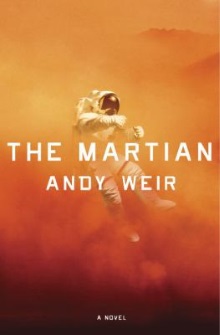
As the impending release of the movie based on it makes obvious, this is one of the most prominent science-fiction novels in recent years. It started life as a piece of original fiction freely available on the web and was picked up by a publisher only after it gained popularity. Appropriately enough for our time, the print version of the novel is the last version to become available as both the ebook and audio versions preceded it. Personally I became interested in reading this because it shows up often in lists of recommendations in rationalist fiction circles, a sub-genre that is now burgeoning thanks to Eliezer Yudkowsky’s Harry Potter and the Methods of Rationality.
Set in the near future in which NASA has embarked on a series of manned exploratory missions onto the surface of Mars, The Martian tells the story of Mark Watney. During a fierce dust storm, his fellow astronauts are forced to quickly evacuate and believe that he is dead after seeing him being impaled by an antenna. However he survives and is left alone on Mars with no way to communicate. Rather than give up, he uses his skills both as a botanist and an engineer to make use of the limited supplies and resources he has on hand to survive for as long as possible on a hostile planet.
Most of the book is therefore a journal of the measures that Watney takes to keep himself alive. Thanks to his oxygen and water reclaimers, he has little fear of running out of run or water and solar power cells provide him with plenty of electrical energy. Food however is the biggest bottleneck as he contemplates having to somehow find enough calories to live on until the next manned Mars mission that is over a year in the future. He solves this by becoming the first farmer on Mars, devoting every square centimeter of his habitat to growing crops. The novel describes in exacting detail every step of the process, from burning the hydrazine fuel to generate the required water to cultivating the bacteria that is needed to make Martian soil support life. Naturally he also has to contend with a myriad of accidents, mistakes and equipment failures as he pushes his gear far beyond their planned life expectancy. As many reviewers have pointed out, if you enjoy watching MacGyver jury-rigging his way out of problems, you’ll love this book.
Critical to making all this work is that everything is scientifically accurate and grounded in reality. Author Andy Weir isn’t actually a NASA engineer but you wouldn’t know it from reading this book. Every detail is accounted for and there are plenty of figures about how many calories of food, kilograms of water, and even number of air filters that Watney thinks he’ll need. The scientific method is much in evidence as Watney performs experiments to determine exactly how much energy his Martian rovers need to travel per kilometer and how to work out the topology of a dust storm while you’re inside it. The depth of Weir’s research extends beyond the technical aspects as well. When NASA realizes that Watney is still alive, the focus switches to finding a way to rescue him and Weir plausibly describes the operating procedures, internal bureaucracy and politics of the organization’s efforts.
Its major failing is one that it shares with too many other works in this sub-genre: shallow characterization and almost non-existent emotional depth. Watney isn’t an emotional robot. Part of the fun of this book is his wry humor when confronted with disaster after disaster. Yet his psychological resilience in the face of total isolation, stark deprivation and constant danger is frankly inhuman. Weir clearly has no interest in writing about the feels of the situation. Its all about the concrete, physical actions of a smart, can-do engineer. You can even note this focus in the way that the supporting characters, the other astronauts in his team and the NASA and JPL staff who work overtime to save him, are all pretty flat stereotypes.
Prose-wise, the novel uses language that is simple and straightforward. It has no literary pretensions or ambiguity whatsoever. This does make it easy to read and understand but it would be hard to call it beautiful or even inspiring. It never gets boring though, even if it’s just a story of one man trying survive day by day. You start to feel for Watney and hope that he catches a break. Still, there’s something about the simplicity of the text and the perfectly timed interruptions of danger that suggests to me that this was written with a view towards making this into a film from the get-go. It even manages to work in a good role for China to help out, which Hollywood filmmakers love these days to please Chinese audiences.
As anyone who follows science-fiction knows, this has been a tumultuous year for the Hugo Awards. The physical publication date of The Martian apparently qualified it for this year’s award yet despite it being a highly prominent release, I found it telling that it didn’t even make the nomination shortlist. This snub basically agrees with my own thoughts about the book. It’s a solid read, enjoyable, technically interesting and offers some decent thrills. But however much mainstream success it achieves, it’s also lightweight, philosophically shallow and ultimately rather forgettable.
One thought on “The Martian”